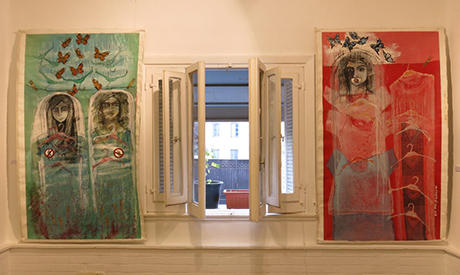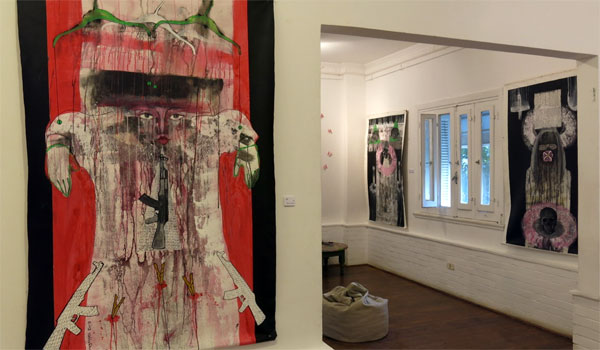
Rima El-Mozayyen at Art Lounge (Photo: Soha Elsirgany)
Palestinian artist Rima El-Mozayyen takes the role of both artist and activist with her artwork bringing to the surface a wide range of women’s issues.
Titled 'I'm Not a Doll,' the latest exhibition of her paintings, which opened on 7 February in Art Lounge, tackles issues of rape, domestic violence, harassment, FGM (female genital mutilation) and child marriage.
Placed next to the artwork, the Arabic title of each piece is important — pointing very directly to the issues El-Mozayyen evokes in each painting, some of them reminiscent of signs in demonstrations for women’s rights.
The exhibition is meant to spur discussion around these issues and empower women against different types of oppression wielded against them in certain patriarchal Arab societies.
In parallel to issues of violence against women, El-Mozayyen tackles an overlooked yet equally serious imposition on women’s freedoms, expressed through standards of beauty.
She finds women’s slavery to modern beauty standards a type of self-entrapment women impose on themselves.
“All women have started looking alike. Everyone is trying to reach an ideal appearance we see on television. We miss natural beauty and natural faces that are beautiful in their own right,” El-Mozayyen says.
One of her series is about love, exploring the different states of love a woman might experience, with a piece titled 'Love in the Time of War.'
In some pieces, El-Mozayyen adds Arabic calligraphy in her own hand, with repeated words of delicate lines that resemble an ornate pattern.
In her piece 'Al-Thaluth Al-Moharam' (The Three Sins), the words sex, religion and politics are written in small hand, patiently, over and over again.
Their redundancy adds an element of insistence, acting as reminders, keywords, to fuel discussion of core issues, as if trusting that by repeating them taboos will be broken.
El-Mozayyen reveals that viewers have told her that her paintings look happy on the surface, but start to reveal their seriousness and sadness upon closer inspection, and upon reading their titles.
This, the artist says, is something she learned and adopted from her father, prominent Palestinian artist Abdulrahman El-Mozayyen, known for his iconic political posters in the 1980s.
“People see enough distress on the news. As an artist, I must offer an alternative, beautiful way of portraying serious or depressing issues so people might better deal with them,” she recounts — her father’s words that she now lives by.

Rima El-Mozayyen at Art Lounge (Photo: Soha Elsirgany)
Her paintings are layered, adding depth and visual complexity by merging symbols, layering transparent paint, and collage. Her palette has lots of pink, a colour the artist chose for femininity, and holds cultural significance for her as a much used color in Palestine for women's dresses.
While most of the paintings are produced on stretched canvas, El-Mozayyen displays a collection that escapes the canvas frame, echoing the subject of freedoms that she is tackling.
These paintings hang like vertical banners, with just the upper and lower bars of the canvas in place, letting the sides relax loosely.
“I’ve been using this technique for a while now. I always like to experiment, but not just for the sake of it; it has to serve the subject,” El-Mozayyen says
There are many recurrent symbols in the pieces — the most dominant being the women’s eyes that peer out of the paintings.
“The eyes I portray are neither happy nor hopeless, but rather have a look of reproach."
Other symbols are clothes hangers and clothes pins; these the artist has used liberally over previous projects, with their meanings changing according to different topics she deals with.
“For 'I’m not a Doll' the clothes hangers resemble puppet string holders, representing shackles that might bind a woman and limit her movement,” El-Mozayyen says pointing to the word "El-Arousa" in the Arabic version of the exhibition title, and which can be translated as both "doll" or "puppet."
Some viewers might directly link these objects with housework, as they relate to laundry and housekeeping, which in some societies is a woman’s limited role.
“I’ve used the clothes hangers before to resemble warplanes attacking people, to express loss, as objects we might use to hang the clothes of people we mourn,” she adds.
El-Mozayyen works with different media, such as installations. She has also produced a number of video art projects, including 'Freedom on Paper,' which screened in Art Lounge on 9 February.
The short video deals with how we have the freedom to express everything we want on paper, through writing or drawing, but have less freedom on the ground.
The Palestinian artist has been in Egypt before, living in Cairo for seven years when she studied at Helwan University.
“Egypt is a centre for all types of artists, but the topics I see now might be more about freedoms, with the revolution being a rich subject to draw from,” she says.

Rima El-Mozayyen at Art Lounge (Photo: Soha Elsirgany)
Programme:
I'm Not a Doll continues until 27 February
Art Lounge, 37 B Ahmed Heshmat street, 1st floor, Apt. 2, Zamalek, Cairo
Short link: